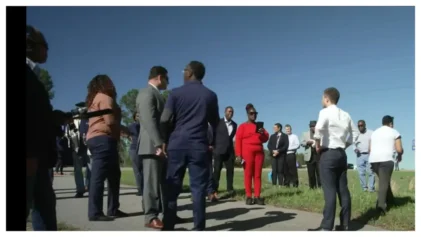In July, Attorney General Jeff Sessions announced that the Department of Justice would reinstate its civil forfeiture policy. Civil forfeiture allows law enforcement officers to seize the property of those suspected of crimes. This seizure can occur even if there is no conviction or arrest. Moreover, in some jurisdictions, law enforcement departments get to keep what they find in these situations, providing a perverse profit motive for seizing property.
Sessions’ decision was controversial, as 84 percent of Americans disapprove of the civil forfeiture. Liberals and conservatives agree that the practice is problematic. The editors of the conservative National Review called the practice “constitutionally questionable.” An ACLU representative said, “This move will be devastating for all Americans, but especially for communities of color, who are already subjected to unconstitutional violations and over policing.” Here’s what you need to know about this program and its impact on the Black community.
Being convicted of a crime has consequences. However, those consequences come after a jury has found the defendant is guilty beyond a reasonable doubt and a judge has determined the proper sentence.
The same is not true of civil forfeiture. As mentioned, civil forfeiture allows the police to seize an individual’s property without a conviction — or even an arrest. Though a jury must find a defendant guilty beyond a reasonable doubt in a criminal case, in 48 states, the police can seize property under a lower legal standard. So, while a clear finding of guilt is required to jail a person, no such finding is necessary to seize her property. Moreover, because no judges or jurors are involved in the decision to take the property, the decision is up to the individual officer.
There is a significant amount of money involved in civil forfeitures. Since 2007, federal agencies have seized approximately 28 billion dollars in assets from private citizens. In many states, the police department can keep the money or item for its own use. Only seven states require that any funds seized go to programs unrelated to law enforcement.
Because there is no court oversight and a significant amount of money involved, many have argued that the police are motivated to seize property even when evidence of a crime is minimal. Critics refer to this practice as “policing for profit.”
Although some states have made it more difficult to seize property and limited how seized property can be used, Sessions’ announcement undermines both of these efforts.
In 1984, Congress passed a law that allowed state and local agencies to transfer seized assets to the federal government. This arrangement, called “adoptive forfeiture,” can be used even when no federal law has been violated. Under this arrangement, the local police get 80 percent of the seized assets once they are returned.
Eric Holder, Attorney General under President Barack Obama, changed federal policy to end the adoptive forfeiture program. Sessions just revived it.
Sessions’ decision matters for two reasons. First, Sessions stated that the federal government would only seize property where the officers had probable cause believe it was involved in a crime. However, in some states, as noted, above, the standard is higher. Thus, Sessions has effectively lowered the standard in those states.
Second, under the federal adoptive forfeiture rules, the assets returned to the state can only be used for law enforcement purposes. Though, as previously noted, some states prohibit this practice to keep officers from seizing property to benefit their departments, Sessions’ rules provide an easy way around those laws.
In sum, Sessions made it easier for the police to take property, even in states where the law is clearly contrary to this practice.
Many assume that civil forfeiture laws only impact criminals. This assumption is wrong. Many innocent people have had their property seized over the years. Stories abound of average citizens being stopped by officers for doing nothing more than driving on a road alleged to be a drug corridor, as happened in Tenaha, Texas. In Tenaha, the police stopped out-of-town drivers and threatened criminal charges unless the motorists agreed to sign over their property to the police department. Though some jurisdictions have an innocent owner defense, under federal law and in 35 states, the person must prove his or her innocence to recover the property. In essence, in this instance, the owner is guilty until he proves himself innocent. Moreover, it can be time-consuming and expensive to get one’s property back.
Of course, like most aspects of the criminal justice system, civil forfeiture laws have the most impact on nonwhite citizens. In Tenaha, Texas, the majority of drivers stopped were African American. Similar patterns occurred in Oklahoma, Philadelphia, and Montgomery County, Maryland. Because officers are more likely to stop Black and Latino drivers, these people are the most likely to have police contact. Once in contact with the police, in many states, officers need little justification to seize the motorists’ property.
While civil forfeiture is a problem, it is not an unsolvable one. Because forfeiture begins with the police, ask your local elected officials where they stand on forfeiture issues.
Also, there is bipartisan legislation in Congress — the FAIR Act — that would raise the standard of proof required to seize property, which would make it harder to seize the property of innocent persons. It would also eliminate the adoptive forfeiture program. Call, write, or tweet your federal representatives and ask them to vote for the FAIR Act. Every step toward eradicating civil forfeiture is a step in the right direction.


